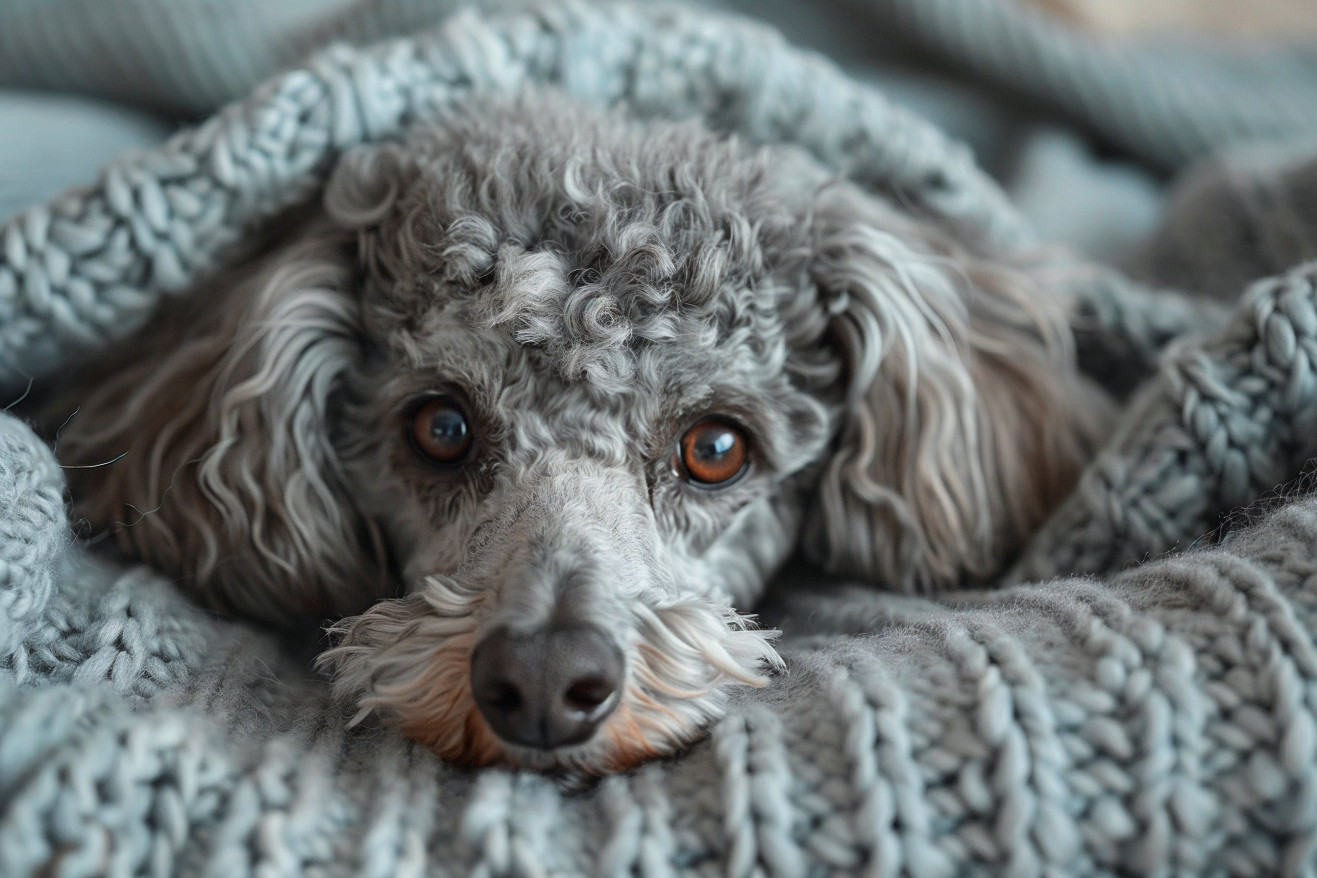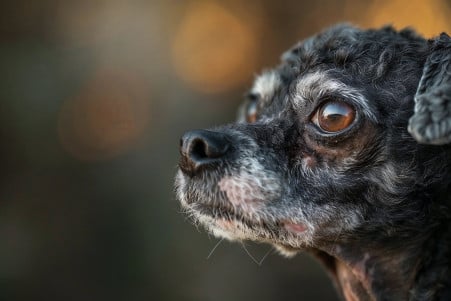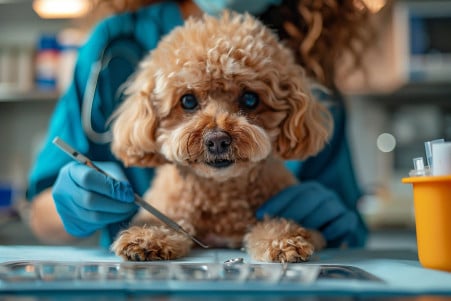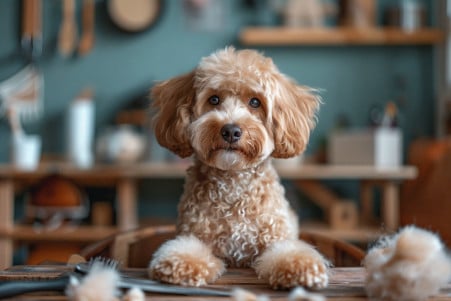Vitamin Deficiencies and Canine Hair Loss: What Owners Should Know
9 April 2024 • Updated 8 April 2024

Dealing with hair loss in dogs can be frustrating, but did you know that it could be due to a vitamin deficiency? In fact, a lack of certain vitamins and minerals, such as protein, zinc, and specific B vitamins, can cause dogs to have dry, dull fur and shed more than usual. To make sure that your dog's coat stays healthy and shiny, it's important to make sure that they're eating a diet that's been recommended by a veterinarian and that contains the right levels of vitamins.
Although supplements can be used to help control some of these issues, it's important to know what's causing the deficiency in the first place. In this article, we'll take a look at the research that's been done on these vitamin deficiencies that can cause hair loss, including studies that have been done on specific dog breeds that are more prone to certain vitamin deficiencies. By learning about the different deficiencies that can affect a dog's coat, you can make sure that you're better prepared to make sure that your dog is getting the right nutrition to keep their coat full and shiny.
Can vitamin deficiencies cause hair loss in dogs?
Biotin Deficiency: A Common Cause of Skin and Coat Problems
One of the most common causes of hair loss and other coat problems in dogs is biotin deficiency. Biotin, also known as vitamin B7, is an essential nutrient that supports healthy skin and coat. When biotin levels are low, dogs can develop a variety of skin and coat problems, including dry, scaly skin, hair loss, and alopecia, according to research cited by Relievet.
Other symptoms of biotin deficiency include a poor-quality coat, scaly skin, loss of appetite, and poor growth, especially in large breeds and fast-growing puppies. In some cases, dogs may also develop skin lesions, as mentioned in an article from Ace Canine Healthcare. Some breeds, including Boxers, Airedales, Bulldogs, and Schnauzers, are more susceptible to biotin deficiency and the alopecia it causes.
There are several reasons why dogs may develop biotin deficiency. A diet that doesn't include enough biotin-rich foods, such as organ meats, eggs, and nuts, is a common cause. Long-term use of antibiotics can also lead to biotin deficiency by killing the bacteria in the gut that produce biotin. Some drugs, including anticonvulsants, can reduce biotin absorption, and metabolic disorders can increase the body's need for biotin.
The good news is that biotin deficiency is easy to treat. Studies have shown that supplementing with biotin at a dose of around 5mg per 10kg of body weight per day can help restore biotin levels and improve symptoms, according to clinical studies cited by PubMed. Making sure your dog's diet includes plenty of biotin-rich whole foods can also help. However, it's important to talk to your vet to make sure your dog is diagnosed accurately and to get a treatment plan that's tailored to their specific needs.
Vitamin and Mineral Deficiencies That Can Cause Hair Loss
Although biotin deficiency is a well-known cause of hair loss in dogs, it's not the only vitamin or mineral deficiency that can result in coat problems. In addition to biotin, Dogster explains that deficiencies in vitamins A, E, and the mineral zinc can lead to dry, brittle coats, hair loss, and other skin issues in dogs.
Vitamin A is essential for skin and coat health. A deficiency in this fat-soluble vitamin can result in scaly, hairless patches on a dog's skin. Meanwhile, a lack of vitamin E has been associated with hair loss and skin problems, according to a 2014 study that looked at the impact of vitamin E supplementation in dogs with atopic dermatitis.
Zinc is an important mineral for coat health. PetLovers notes that a zinc deficiency can lead to hair loss around the eyes and hyperkeratosis, which is a condition that causes the skin to thicken and harden, on the elbows and nose. Meanwhile, copper deficiency can cause a dog's coat to become dull and discolored and lead to patchy hair loss.
Vets can diagnose these deficiencies with blood tests and physical exams. Once the specific deficiency has been identified, they can recommend the appropriate supplements or dietary changes to correct the imbalance. As OmegaQuant points out, omega-3 fatty acids, biotin, and vitamins A and E can all help support healthy skin and coats in dogs.
However, while it's important to address vitamin and mineral deficiencies, hair loss in dogs can also be caused by other underlying issues that go beyond nutrition. The next section will cover some of these other potential causes that may be contributing to your dog's coat problems.
Other Causes of Hair Loss in Dogs
While vitamin deficiencies can play a role in hair loss in dogs, there are many other potential causes that go beyond nutritional concerns. Per Paw CBD, hair loss in dogs can also be caused by ectoparasites like fleas, ticks, lice, and mange mites, as well as allergies, a number of diseases and disorders, and even stress-induced behaviors.
According to Dutch, some of the most common reasons for hair loss in dogs include infections, hormonal imbalances like Cushing's disease, genetic factors, and other medical issues. In order to determine the cause, vets may need to run blood tests, skin scrapes, and biopsies.
Treatment options can be quite varied based on the diagnosis. As WagWalking notes, some of the medications that may be prescribed include antibiotics, antifungals, and steroids. In addition, some of the home remedies that may be suggested include medicated shampoos, supplements, and topical treatments, although these should be used under the guidance of a vet.
It's important to make sure you get professional veterinary help if your dog is experiencing hair loss, as it could be a sign of a more serious medical issue. However, by working with your vet to determine the cause and find a solution, you can help your dog get back to having a full, shiny coat. In many cases, dogs can recover and regrow their hair with the right treatment plan.
Nutritional Solutions: The Best Dog Food for Healthy Skin and Coat
To keep your dog's skin and coat healthy and shiny, you need to feed them a diet that's well-balanced and full of essential nutrients. According to IAMS™, proteins, fats, vitamins, and minerals are all important for maintaining skin and coat health.
High-quality animal proteins, such as those found in chicken, beef, and eggs, provide the amino acids that are the building blocks of healthy skin and coat. On the other hand, omega-3 and omega-6 fatty acids found in fish and plant oils help maintain the skin's cell membranes and reduce inflammation, notes BetterVet.
Vitamins A, E, and B vitamins like biotin and riboflavin are also important for maintaining a dog's skin and coat health by supporting cell growth and repair, says Arden Grange. Finally, minerals like zinc, copper, and selenium are also important for maintaining a dog's coat.
When you're looking for a dog food that will help keep your dog's coat healthy, Dogster suggests that you look for foods that contain these nutrients in whole food form rather than as synthetic supplements. In addition, transitioning your dog to a new food slowly, as recommended by the American Kennel Club, can help you address hair loss by making sure your dog is getting the best nutrition for their skin and coat.
By making sure your dog's diet includes plenty of these essential nutrients, you can make sure that your dog's coat stays healthy and shiny and that you can avoid hair loss in the future.
Conclusion: How to Keep a Healthy Coat With the Right Nutrition
Keeping a dog healthy overall starts with feeding them a balanced, nutrient-dense diet. By making sure that your dog gets all of the essential vitamins, minerals, proteins, and fatty acids that are needed to support skin and coat health, you can help prevent and treat hair loss.
It's important to work with your vet to get a proper diagnosis of any underlying deficiencies or other causes of hair loss and to come up with a treatment plan. With the right nutritional support, you can help your dog get a healthy, shiny coat that reflects their overall health.


